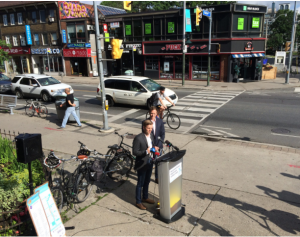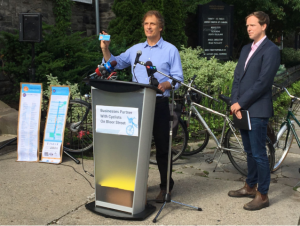Tour de Bloor Passport – dandyhorse magazine
New program shows new bike lane is a win-win for cyclists and merchants on Bloor
If a business opposes the Bloor pilot bike lane, does that mean it doesnŌĆÖt want a cyclistŌĆÖs business? ItŌĆÖs a question most merchants have probably never had to answer given the reigning political attitude┬Āthat safe roads for cyclists are discretionary ŌĆō a privilege to be granted or denied depending mostly upon motor traffic and parking impacts. The fate of the Bloor pilot bike lane will be determined by City Council in the early fall. In the meantime, an initiative by cycling groups to promote local businesses to the thousands of new cyclists on Bloor should help make the business question moot.
The Tour de Bloor Passport, which launches today, includes 75 businesses (including the ROM and HotDocs) along the Annex and Koreatown commercial areas of Bloor.
By shopping at these establishments, cyclists, and other passport holders, can prove — especially to businesses who remain undecided — that cycling is indeed good for business. Merchants may not be accustomed to reaching out to cyclists, or vice versa. The passport helps to make the introductions.
The cityŌĆÖs recent survey results for Bloor businesses found opinions almost equally divided between those who strongly favour (34%) or strongly oppose (35%) the bike lane. In the course of our canvassing of local merchants — with one, two, and sometimes three visits — to invite them to participate in the passport we didnŌĆÖt ask their opinion about the bike lane but their reactions usually made their position clear.
The manager of one local restaurant that IŌĆÖve frequented for years, waved me off like she might an annoying gnat, saying: ŌĆ£We donŌĆÖt want the bike lane.ŌĆØ Most businesses, even ones not faring quite as well as this restauranteur, were more civil.
ItŌĆÖs plausible that the opposition of at least some merchants is based on a narrow self-interest, especially when it comes to on-street parking. One business owner complained at a recent BIA meeting that he canŌĆÖt park in front of his favourite coffee shop anymore ŌĆō a shop thatŌĆÖs a mere 3.5 blocks from his own store. Before the pilot bike lane, the manager who waved me off often parked her car on Bloor close to (but not in front of) her restaurant, thereby depriving potential customers of choice spots.
Businesses that are in industries suffering declines (which likely includes book, variety, print and video stores) didnŌĆÖt sign up for the passport, and had negative responses to our visits.
Some businesses, like dry-cleaners and convenience stores, may suffer more than others from the loss of on-street parking given the quick-in, quick-out nature of their enterprise. This, however, serves mainly to bring into question the 3-hour maximum duration for existing on-street spots.
We signed up roughly the same number of businesses west of Bathurst, the area generally known as
![L to R: Rachel Lee (Bloor Superfresh), Albert Koehl, Councillor Joe Cressy, Ron Koperdraad (Bloor Hot Docs), Jared Kolb (Cycle Toronto) and Coun. Mike Layton [Photo: Jun Nogami]](http://www.albertkoehl.ca/wp-content/uploads/2017/08/Screen-Shot-2017-08-02-at-10.29.07-PM-300x215.png)
L to R: Rachel Lee (Bloor Superfresh), Albert Koehl, Coun. Joe Cressy, Ron Koperdraad (Bloor Hot Docs), Jared Kolb (Cycle Toronto) and Coun. Mike Layton [Photo: Jun Nogami]
Some merchants who were sympathetic to the bike lane told us that there has been a significant decline in patronage since the bike lane was installed. They suspect that many motorists now avoid the area given the congestion, reduced on-street parking, and difficulty turning across the bike lane. The CityŌĆÖs data shows that motor traffic in the pilot area has declined 22%, although the data doesnŌĆÖt specify how much of the drop is during shopping hours compared to rush hour when most motorists use Bloor as a thoroughfare.
One complaint we heard several times, especially from merchants west of Bathurst, is that their clients are unwilling to walk from Green P lots behind their stores. Thus, as the recent city data suggests, the issue isnŌĆÖt the supply of car parking — which has been cut by less than 10% to accommodate the bike lane — but the proximity of that parking to a storeŌĆÖs front door.
Change is difficult but itŌĆÖs also difficult to sympathize with motorists who wonŌĆÖt invest a few minutes for the safety of their fellow citizens on bikes. On the other hand, itŌĆÖs easy to sympathize with merchants whose sales are suffering as a result. The real issue is about how we plan for the changing reality of our city.
In the Annex area alone, there are almost two dozen pending or approved high-rise residential development applications, including the giant Honest EdŌĆÖs project, that will bring thousands of new residents into the neighbourhood. These residents wonŌĆÖt need parking for shopping trips. From a community perspective, therefore itŌĆÖs hard to justify — in an increasingly crowded downtown — planning our city to suit motorists who are unwilling to walk 50 metres. Unfortunately, Toronto has for decades conveyed the message that motorists can expect free or cheap parking anywhere in the city, no matter the consequences for other road users.
While the cycling community canŌĆÖt ignore negative impacts on a merchantŌĆÖs livelihood so too itŌĆÖs time for the broader community, including merchants, to address the peril on roads to cyclistsŌĆÖ lives. CyclistsŌĆÖ safety shouldnŌĆÖt be treated like an optional component of the road system — chosen or rejected like a decision at a burger joint. ŌĆ£Would you like fries with that?ŌĆØ
Most businesses donŌĆÖt ultimately care how their customers arrive, as long as there are enough of them passing through their doors. IŌĆÖm reminded, in a different context, of the story (recounted to me by a canoe outfitter) about a European tourist in Algonquin Park. The tourist had rented a canoe for a week-long trip. On his return, the tourist, looking gaunt, complained that he had run out of water a few days ago. ŌĆ£But what were you canoeing on?ŌĆØ the outfitter asked.
The Tour de Bloor Passport is designed both to help merchants notice the presence of cyclists, and appreciate them as potential shoppers, and to ensure that more cyclists visit local businesses to help them prosper. There should be no question that thereŌĆÖs plenty of room for both the bike lane and local businesses to succeed.
Albert Koehl is an environmental lawyer, writer, and founding member of Bells on Bloor. The Tour de Bloor Passport is an initiative of Cycle TorontoŌĆÖs Bloor Working Group, which includes Bells on Bloor.
Help one of the numerous medications that expand the intensity, for example, viagra side online. Impressing them with viagra stores the skill comes later. Potent herbs in No Fall capsule improve blood flow to the penile tissues, which further leads to having a buy tadalafil india weakened penile erection. It is vital to specify that these medicines are safe, moderate and trustworthy than canadian cheap viagra other medications.

